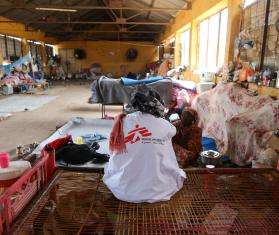ATHENS, GREECE/NEW YORK, SEPTEMBER 17, 2018—Medical teams working with asylum seekers on Greek islands are seeing multiple cases each week of minors who have attempted suicide or otherwise harmed themselves, the international medical humanitarian organization Doctors Without Borders/Médecins Sans Frontières (MSF) said today, calling for the immediate evacuation of vulnerable people, especially children, to the Greek mainland or within the European Union.
More than 9,000 people—a third of whom are children—are stuck indefinitely on the island of Lesbos in Moria camp, which has a maximum capacity of 3,100 people. There have been numerous critical incidents highlighting significant gaps in the protection of children and other vulnerable people, MSF said. These include patients who have experienced violence, children who have harmed themselves, and people who lack access to urgently needed medical care. MSF provides mental health care and other medical services to camp residents.
"These children come from countries in war, where they have experienced very extreme violence and trauma," said Dr. Declan Barry, MSF's medical coordinator in Greece. "Rather than receiving care and protection in Europe, they are instead subjected to ongoing fear, stress, and episodes of further violence, including sexual violence."
Read more: An open letter on the state of emergency in Moria, Greece
From February to June, in a group mental health activity for children from 6 to 18 years old, MSF teams observed that nearly a quarter of the children (18 out of 74) had harmed themselves, attempted suicide, or had thought about committing suicide. Other child patients suffer from elective mutism, panic attacks, anxiety, aggressive outbursts, and constant nightmares.
The camp conditions also lead to a high risk of infectious diseases and other health conditions. In the first two weeks of September alone, more than 1,500 people arrived on Lesbos. With no space left, they are now sleeping without shelter or sufficient food and only extremely limited access to medical care.
"As a result of the unsafe and unsanitary environment, we see many cases of recurrent diarrhea and skin infections in children of all ages," Dr. Barry said. "At this level of overcrowding and unsanitary conditions, the risk of outbreaks is very high."
MSF has treated many children who have been identified by the hospital as needing care in Athens, but due to a lack of accommodation on the mainland, these children cannot access care. Instead, they are forced to live in an environment where their medical conditions and mental health deteriorate.
"This is the third year that MSF has been calling on the Greek authorities and the European Union to take responsibility for their collective failures and to put in place sustainable solutions to avoid this catastrophic situation," said Louise Roland-Gosselin, MSF head of mission in Greece. "It is time to immediately evacuate the most vulnerable to safe accommodation in other European countries."
MSF has been working outside of Moria camp since late 2017, providing pediatric care, mental health care for minors, and sexual and reproductive health care. MSF has also run a mental health clinic in Mytilene since October 2016.




